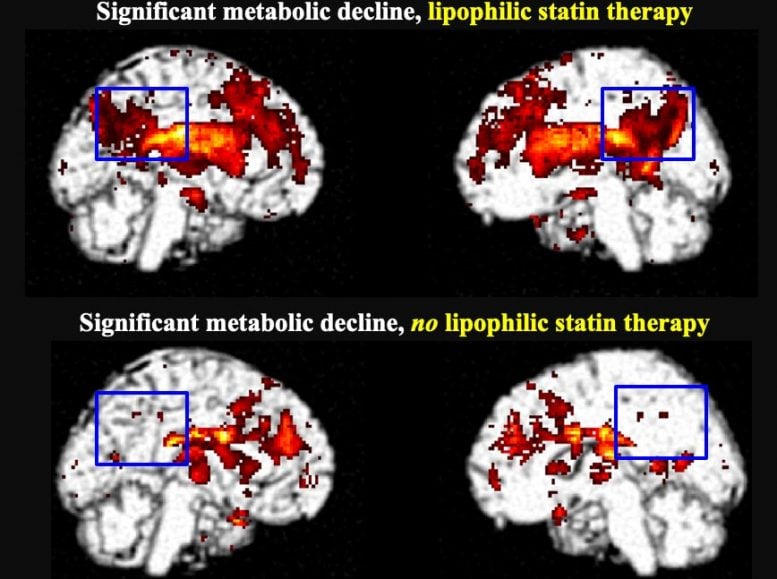
Significant metabolic decline in the posterior cingulate cortex in lipophilic statin users after five to six years (top) compared to hydrophilic statin users and non-statin users (bottom). Credit: Image created by Prasanna Padmanabham and Daniel Silverman, UCLA
In patients with mild cognitive impairment, taking lipophilic statins more than doubles their risk of developing dementia compared to those who do not take statins. According to research presented at the Society of Nuclear Medicine and Molecular Imaging 2021 Annual Meeting, positron emission tomography (PET) scans of lipophilic statin users revealed a highly significant decline in metabolism in the area of the brain that is first impacted by Alzheimer’s disease.
Statins are medications used to lower cholesterol and reduce the risk of heart attack or stroke. They are the most commonly used drugs in the developed world, and nearly 50 percent of Americans over age 75 use a statin. Different types of statins are available based on a patient’s health needs, including hydrophilic statins that focus on the liver and lipophilic statins that are distributed to tissues throughout the body.
Lipophilic statins include simvastatin, fluvastatin, pitavastatin, lovastatin and atorvastatin. Hydrophilic statins include rosuvastatin and pravastatin.
“There have been many conflicting studies on the effects of statin drugs on cognition,” said Prasanna Padmanabham, project head, statins and cognition in the molecular and medical pharmacology student research program at the University of California, Los Angeles in Los Angeles, California. “While some claim that satins protect users against dementia, others assert that they accelerate the development of dementia. Our study aimed to clarify the relationship between statin use and subject’s long-term cognitive trajectory.”
Researchers separated study participants into groups based on three parameters: baseline cognitive status, baseline cholesterol levels, and type of statin used. Participants underwent 18F-FDG PET imaging to identify any regions of declining cerebral metabolism within each statin group. Eight years of subject clinical data was analyzed.
Patients with mild cognitive impairment or normal cognition who used lipophilic statins were found to have more than double the risk of developing dementia compared to statin non-users. Over time, PET imaging of lipophilic statin users also showed a substantial decline in metabolism in the posterior cingulate cortex, the region of the brain known to decline the most significantly in the earliest stages of Alzheimer’s disease. In contrast, no clinical or metabolic decline was found for users of other statins or for statin users with higher baseline serum cholesterol levels.
“By characterizing the metabolic effects associated with statin use, we are providing a new application of PET to further our understanding of the relationship between one of the most commonly used classes of drugs and one of the most common afflictions of the aging brain,” noted Padmanabham. “Findings from these scans could be used to inform patients’ decisions regarding which statin would be most optimal to use with respect to preservation of their cognition and ability to function independently.”
Reference: “Lipophilic Statins in Subjects with Early Mild Cognitive Impairment: Associations with Conversion to Dementia and Decline in Posterior Cingulate Brain Metabolism in a Long-term Prospective Longitudinal Multi-Center Study” by Prasanna Padmanabham, Stephen Liu and Daniel Silverman, 18 May 2021, The Journal of Nuclear Medicine.
Link
Abstract 102. “Lipophilic Statins in Subjects with Early Mild Cognitive Impairment: Associations with Conversion to Dementia and Decline in Posterior Cingulate Brain Metabolism in a Long-term Prospective Longitudinal Multi-Center Study,” Prasanna Padmanabham, Stephen Liu and Daniel Silverman, University of California, Los Angeles, Los Angeles, California.
The Society of Nuclear Medicine and Molecular Imaging (SNMMI) is an international scientific and medical organization dedicated to advancing nuclear medicine and molecular imaging, vital elements of precision medicine that allow diagnosis and treatment to be tailored to individual patients in order to achieve the best possible outcomes.









Boy, am I glad that I take rosuvastatin! I was on atorvastatin years ago but the doctor took me off them because of side effects. Doing fine with the rosuvastatin.
Just check the biochemistry of statin ‘action’, then you would want to ban statin use.
I want to know if there is any proof that taking statins have any benefit for why they are taken. Are there 90% less heart disease patients over a 20 year period taking them? Are there less stroke victims? I have my doubts as to needing an adjustment of our body’s lipid level. So mine was 220, and the doctor put me on Astorvastatin. It now is below 200. But so what? I have had EKG’s recently and all is fine. I suspect it is another way for pill makers & doctors to make money.
Years ago my friends brother in law became so demented they were looking at facility options. They decided to try one more specialist and took him to Duke. He took him off almost all meds including his cholesterol med and he cleared up 100%. Ever since then I’ve known those meds are dangerous. I hope this story is shared more.
My husband has hereditary high cholesterol. He became a vegetarian and his levels have been near normal ever since.
My mother has severe brain fog on statins. She thought she was having early dementia. Brain tissue is very rich in cholesterol. Cholesterol is important. It’s more important to improve lipoprotein size and quality than to focus on lowering the total amount. Sadly, drugs can’t do this, so it is ignored, and people are sold this snake oil.
Just saying from having bipolar disorder, dealing with medication is a constant fight that is either/or frustrating,exhausting, and questionable practices that leaves you wondering so much.We have alot to learn,its been 12 years since I was diagnosed and I still suffer too much for someone on 16 different pills.Few help,some I cant get thru the side effects, I’m depressed but antidepressants cause me to become more manic more often.I suffered from migraines my whole life, was a natural supplement that brought my sing of migraine meds from from running out half way through the month, to having extra to spare how.I been on 3 statins ,atorvastatin for past few years but never looked into it.I been trying to fix my mind, not damage it if not needed
I had a massive heart attack attributed to Lipitor. The data was so convincing, Viatris settled for$19M. Stay FAR away from all statins! There are other alternatives, check them out via your physician.
What should I take instead of a statin?
My Dr. whom I absolutely love and Trust. She told me to take Red Yeast Rice. They put me on atorvastatin and it made me feel as if I had been hit by an 18-wheeler. I refuse that is going to make me feel wore than I already do.
After all the reading I had done about statins my doctor knows I will not take them. Has anyone ever died from high cholesterol?
Ah yes another study proving that big pharma jelly beans created and propagated to fill shareholders pockets are more than just a scam, they are poison foisted on the people they are supposedly made to help. SCREW them and their greedy psychopaths.
Statins worsen depression for susceptible Males by interfering with Cholesterol, the basic ingredient for the production of Testosterone.
I stopped taking that crap after my Testosterone level was cut from my Normal 800s to barely 500s, leaving me functionally useless.
My Cardiologist was not impressed, but he’s not the one who had to deal with these side effect.
Pravistatin got me. Still reeling from the effects and memory is the worst.
But what happens when you stop taking them?
I am a retired nurse, and I have for years believed that taking statins was a risk
I just quit taking pravastatin again. I tried quite a few times, and each time I ended up with severe knee and muscle pain. Right now I can barely stand up and walk. Never again!
After just now reading all about Atorvastatin on the BNF NICE app, and reading that the first course of action for any condition they might be prescribed for is to control high cholesterol with diet. Only if that doesn’t bring the desired results should the stain be prescribed. Hands up if you were told this before being prescribed these drugs?
If not, perhaps you should be asking why not?
I was advised to take statins 40 years ago (I’m 81) and have had never ending problems with sciatica, muscular fatigue, etc etc and have stopped and started treatment many times when the symptoms became too hard to bear. There also seems to be some nerve damage caused by statins but I have never seen this mentioned as one of the symptoms of statin use. The nerves in my hands and feet are affected and I drop items continually. Have now given up on statins altogether,am watching my diet and exercising to combat high cholesterol levels. So far I have been successful. Never had problems with my heart even though I was a smoker until the age of 40. I do believe that statins are detrimental to your health in many ways, so please try avoid them. There are alternatives to treat your high cholesterol!